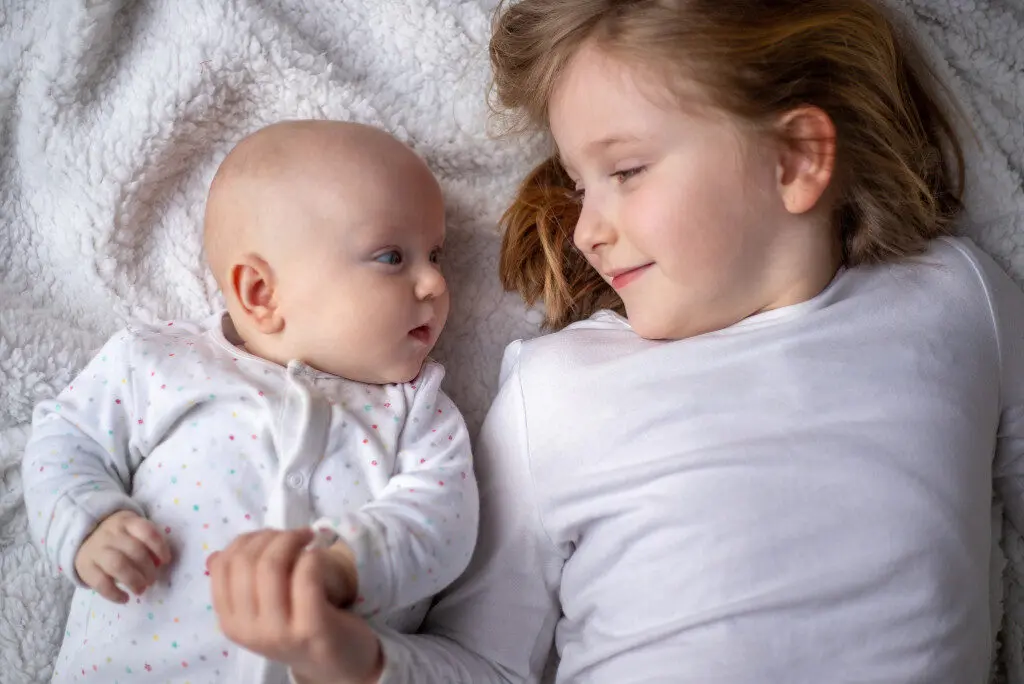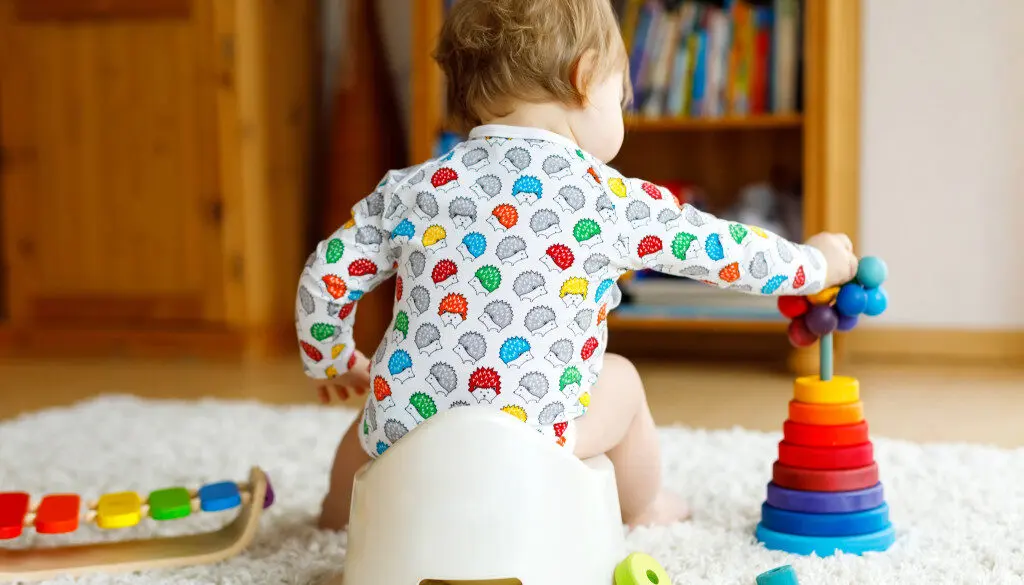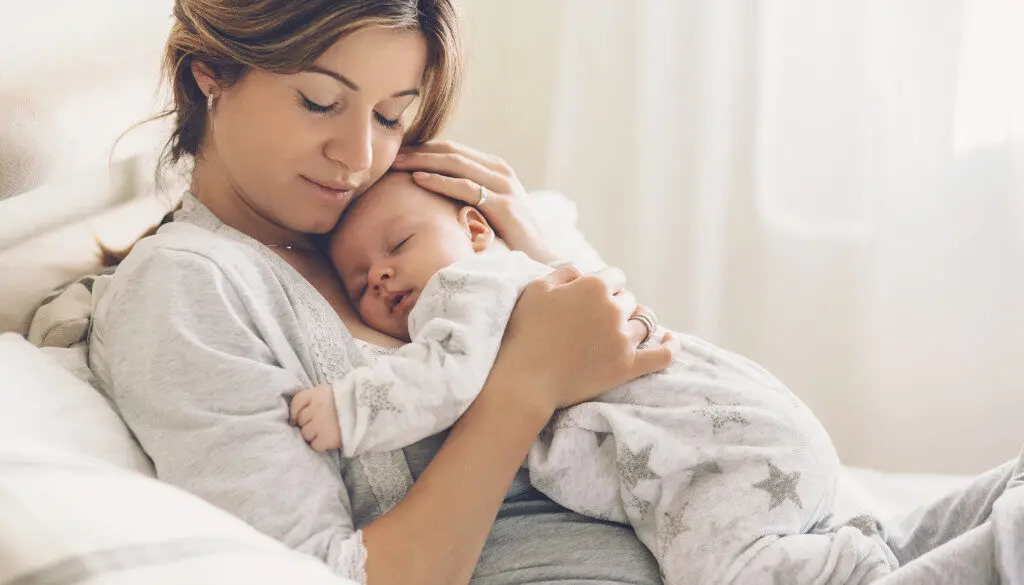As a busy mom-to-be, you might wonder what are the must-haves for your newborn’s diaper bag when heading to the hospital? A well-prepared diaper bag can make a big difference in your hospital stay. It lets you focus on what’s most important – your new baby.
Experts say a well-stocked diaper bag can make you feel more at ease and confident. So, what should you pack? We’ve got you covered with everything from feeding supplies to clothing and comfort items.
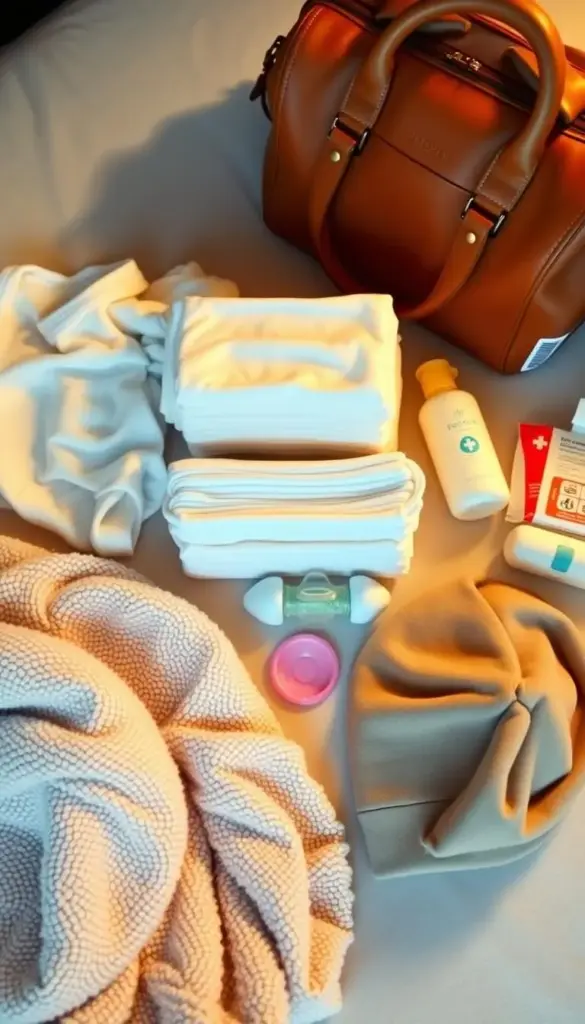
Key Takeaways
- Pack essentials like diapers, wipes, and a change of clothes for your newborn.
- Don’t forget feeding supplies, such as formula or breastmilk storage bags.
- Comfort items like pacifiers and swaddle blankets can be a big help.
- A hospital bag checklist can ensure you’re prepared for your baby’s arrival.
- Remember to include a going-home outfit for your newborn.
Preparing for Your Hospital Stay with a Newborn
Getting ready for your hospital stay with a newborn is key to a smooth experience. Having the right supplies and knowledge is important. It makes a big difference.
Why Proper Preparation Matters
Being prepared for your hospital stay makes you feel in control. It helps you focus on welcoming your baby. You won’t worry about forgetting something important.
As “The American Academy of Pediatrics” says, being ready is essential for a good hospital experience. A well-packed diaper bag ensures you’re ready for your baby’s needs right away.
When to Pack Your Diaper Bag
Pack your diaper bag around 36-37 weeks of pregnancy. This is a good time because it prepares you for an early arrival. It gives you peace of mind as you wait for your baby.
Packing early lets you check everything twice. This avoids last-minute scrambles or forgotten items.
Hospital Stay Duration Considerations
The length of your hospital stay varies. It depends on the delivery type and your baby’s health. A vaginal delivery might be 1-2 days, while a cesarean could be 2-4 days.
Knowing how long you’ll stay helps you pack right. You’ll make sure you have enough for you and your baby.
Ultimate Guide: What to Pack in Your Newborn’s Diaper Bag for the Hospital
Getting ready for your newborn’s arrival means packing the right diaper bag essentials. You’ll want to make sure you have everything for your baby’s comfort and well-being during your hospital stay.
Understanding Hospital Provisions vs. What You Need to Bring
Before you pack, check with your hospital about what they offer. They might provide diapers and wipes. But it’s best to confirm so you know what to bring.
Some hospitals may also offer formula, pacifiers, or baby clothes. But it’s wise to pack your own supplies. This way, you have what you prefer and need.
Choosing the Right Diaper Bag for Hospital Use
Choosing the right diaper bag is as important as what you pack. Look for one that’s comfortable, has lots of compartments, and is easy to get into.
- A sturdy, comfortable strap for carrying
- Multiple pockets for organization
- A waterproof lining for easy cleaning
Consider a bag with a built-in changing pad or a portable mat. This makes diaper changes easier.
Creating a Checklist System
To avoid forgetting anything, make a checklist for your newborn’s diaper bag. Start with the basics like diapers, wipes, and a change of clothes.
Then, think about other useful items. Like:
- Swaddle blankets or sleep sacks
- Onesies or other baby clothes
- Baby toiletries, like lotion and oil
- Going-home outfit
Having a checklist helps you pack everything you need. This way, your hospital stay will be comfortable and stress-free.
Essential Feeding Supplies for Your Newborn
Preparing the right supplies for feeding your newborn can make a big difference. Feeding is a key part of caring for a newborn. Having the right items can help a lot during your hospital stay.
Breastfeeding Essentials
If you plan to breastfeed, you’ll need some important items. You’ll need a good breast pump, nursing bras, breast pads, and nipple shields if you need them. It’s also good to have a breastfeeding guide or a lactation consultant for help.
Some must-haves for breastfeeding include:
- Nursing pillow for comfortable feeding positions
- Breast milk storage bags or containers
- Nipple cream for soothing
Formula Feeding Necessities
If you’re formula-feeding, pack enough formula for your hospital stay. You’ll also need bottles and nipples. Don’t forget a bottle brush and a formula measuring scoop.
| Formula Feeding Item | Quantity | Notes |
|---|---|---|
| Formula | Enough for hospital stay + extra | Check with hospital for specific recommendations |
| Bottles and Nipples | 3-4 sets | Consider bringing different nipple flow rates |
| Bottle Brush | 1 | For cleaning bottles and nipples |
Feeding Support Items
There are many support items that can help, no matter how you’re feeding. These include a bib, burp cloths, and a pacifier if you plan to use one. Having these can make feeding easier and less stressful.
“The key to successful feeding is being prepared and flexible. Having the right supplies can make all the difference in your feeding journey.”
Being ready with the essential feeding supplies lets you focus on bonding with your newborn. Enjoy this special time together.
Clothing and Comfort Items for Your Baby
Choosing the right clothes and items for your newborn is key for comfort during your hospital stay. Keeping your baby warm and cozy is a top priority. The right preparations can make your hospital stay smoother and more enjoyable.
Weather-Appropriate Outfits
It’s important to pack clothes that match the weather. Think about the season and the hospital’s temperature when picking outfits. For example, in winter, include warm clothes like hats, gloves, and socks. In warmer months, choose lighter clothes.
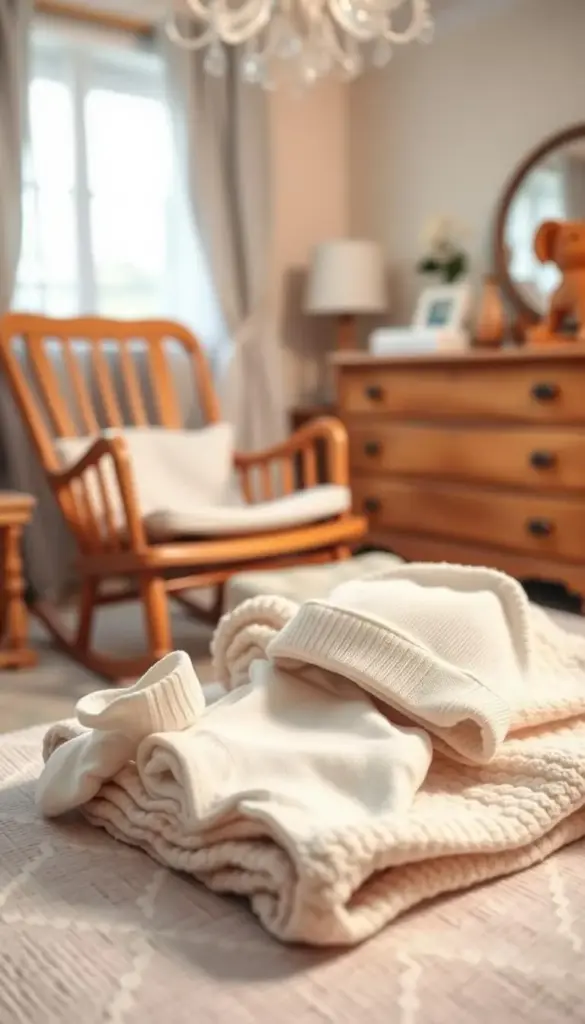
Swaddles and Blankets
Swaddling can be very comforting for newborns. It makes them feel secure and cozy. Pack a few lightweight blankets or swaddles in your diaper bag. These help keep your baby’s body temperature right and offer comfort. If the hospital is warm, choose lighter materials.
Going-Home Outfit Considerations
Remember to pack a special outfit for your baby to wear home. It should be comfy and match the weather. This outfit should go over any hospital clothes, like a hat and socks, to keep your baby warm.
Hats, Mittens, and Socks
Hats, mittens, and socks are small but very important. Newborns lose heat fast, so keeping their head, hands, and feet warm is key. These items are also cute and can be a lovely keepsake. Pack a few sets in case some get lost or dirty during your stay.
By choosing and packing these items carefully, you can ensure your newborn’s comfort. This makes your hospital experience better. It’s all about creating a warm and welcoming space for your baby.
Diapering Essentials for Hospital and Beyond
Being ready with the right diapering essentials is key for a great experience with your newborn at the hospital. Diapering is one of the first tasks you’ll do. Having the right supplies can make a big difference.
Diaper Types and Quantities
Choosing between disposable and cloth diapers is important. Disposable diapers are handy for hospital stays because they’re easy to use and throw away. It’s wise to pack a few dozen, as you can’t guess how many your baby will need.
Newborns usually need size 1 or 2 diapers. Look for diapers that are absorbent and fit well. Some parents like diapers with a wetness indicator to know when to change.
Wipes, Creams, and Changing Accessories
You’ll also need wipes for cleaning your baby’s bottom. Choose gentle, fragrance-free wipes made for newborns. A diaper cream can help prevent diaper rash, which is good for babies with sensitive skin.
A diaper changing pad or mat is useful for a clean and comfy diaper change. Some mats have storage for diapers and wipes, making it easy to keep everything in one spot.
Disposal Solutions for Soiled Items
It’s important to dispose of soiled diapers properly to keep things clean and odor-free. Disposable diaper bags or a portable diaper disposal system are great. They help seal soiled diapers away from your baby’s things.
- Think about a diaper bag with compartments for diapers, wipes, and creams.
- Keep a small stash of diapers and wipes in an easy spot for quick changes.
- Remember to pack extra diapers and wipes in your hospital bag, just in case.
Health and Hygiene Must-Haves
Keeping your newborn healthy and clean is very important. You’ll need the right items for this. As you get ready for the hospital, pack the essentials for your baby’s comfort and health.
Bathing and Grooming Supplies
Hospitals usually have basic bathing areas. But, it’s good to bring some newborn health essentials yourself. Here are a few things to consider:
- Gentle baby washcloths
- Soft, fragrance-free baby soap or body wash
- A soft-bristled baby brush or comb for gentle grooming
These items will help you keep your newborn clean and comfortable during your hospital stay.
First Aid and Medication Considerations
It’s wise to be ready for any situation. For hygiene must-haves, think about these first aid and medication essentials:
- Antibiotic ointment for minor cuts or scrapes
- Vitamin K ointment (if not provided by the hospital)
- Any medications your doctor has recommended for your newborn
Always check with your healthcare provider before bringing any medications to the hospital.
Sanitizing Products for Hospital Environments
Hospitals are clean places, but it’s smart to bring some bathing supplies and sanitizing products. This will help keep your area clean:
- Hand sanitizer for you and your visitors
- Anti-bacterial wipes for cleaning surfaces
These will help you maintain a clean environment for your newborn during your hospital stay.
Parent Comfort and Convenience Items
Your time in the hospital with a newborn is special. Having the right comfort and convenience items can make a big difference. Remember, taking care of yourself is important too.
Personal Care Items for Parents
As a new parent, feeling your best is key. Bring personal care items to stay refreshed and comfortable.
- Toothbrush and toothpaste
- Deodorant
- Hairbrush or comb
- Face wipes
- Any necessary medications
Keep these essentials in a small toiletry bag. It will be easy to find what you need.
Snacks and Hydration Supplies
Hospital food might not be your favorite. Bringing your own snacks and drinks can be a big help. Choose:
- Nuts and dried fruits
- Granola bars
- Fresh fruit
- Water bottle
- Electrolyte-rich drinks like coconut water
These items will keep your energy up during those early days.
| Snack Type | Benefits | Examples |
|---|---|---|
| Protein-rich | Helps maintain energy | Nuts, jerky |
| Fruit-based | Provides essential vitamins | Dried fruits, fresh fruit |
| Hydrating | Replenishes fluids | Water, coconut water |
Entertainment and Documentation Necessities
Having something to do can make your stay more enjoyable. Bring:
- Books or e-reader
- Tablet or laptop
- Phone with charger
- Camera to capture those first moments
Remember to document your newborn’s arrival. Use a journal or take lots of photos.
Being prepared with these items lets you focus on enjoying time with your newborn.
Organization Tips for Your Newborn’s Hospital Diaper Bag
Organizing your newborn’s hospital diaper bag can make a big difference. It helps you find what you need quickly. This includes things like a pacifier, a diaper, or a change of clothes for your baby.
Packing Strategies for Easy Access
To keep your diaper bag organized, use some smart packing strategies. Put the things you need most often at the top or in easy-to-reach pockets. This includes diapers, wipes, and a pacifier. Use small pouches or bags for similar items, like all feeding supplies or clothes.
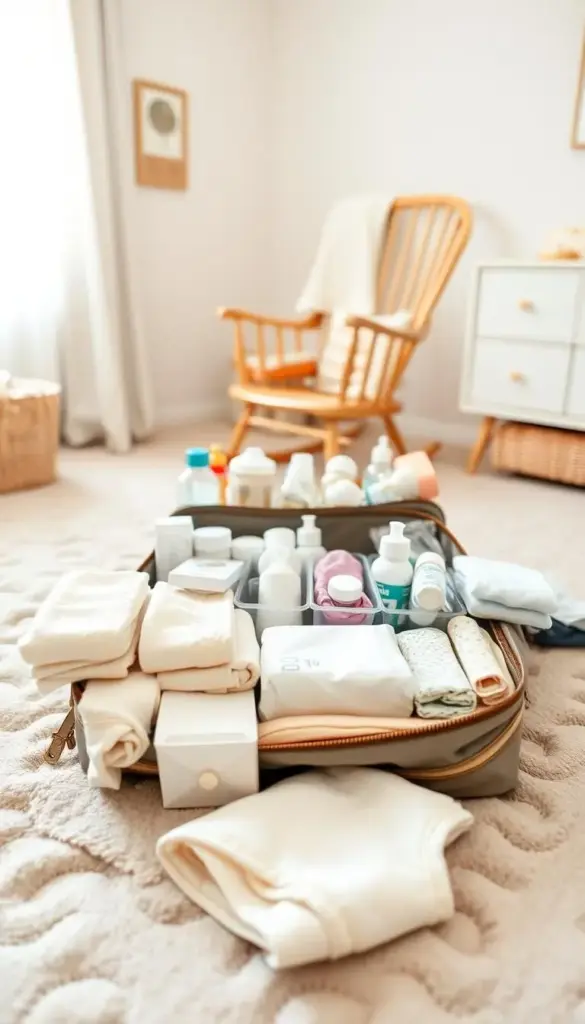
Using Compartments and Organizers Effectively
Most diaper bags have many compartments. These can really help keep things organized. Use different compartments for different items. For example, one for diapering essentials, another for feeding supplies, and another for extra clothes.
If your bag doesn’t have enough compartments, consider extra organizers. Small baskets or pouches can be very helpful.
Pre-assembling Kits for Different Needs
Creating kits for different needs can also be smart. You can make a “changing kit” with diapers, wipes, and diaper cream. Or a “feeding kit” with bottles, pacifiers, and formula (if not breastfeeding).
Having these kits ready can save you time and reduce stress at the hospital.
By using these strategies, your newborn’s hospital diaper bag will be more than just packed. It will be organized, making your hospital stay smoother and less stressful.
Conclusion
Packing your newborn’s diaper bag for the hospital can seem overwhelming. But with this ultimate guide, you’re well-prepared for your hospital stay. You’ll focus on your newborn’s comfort, health, and hygiene, and take care of yourself too.
Make sure to include newborn diaper bag essentials like diapers, wipes, and a going-home outfit. Also, don’t forget to pack a hospital bag checklist to ensure you have everything you need. When packing your newborn diaper bag, remember to include feeding supplies, clothing, and health and hygiene must-haves.
By following these tips, you’ll be well-prepared for your hospital stay and your newborn’s needs. Take a deep breath, and enjoy this special time with your new baby.

